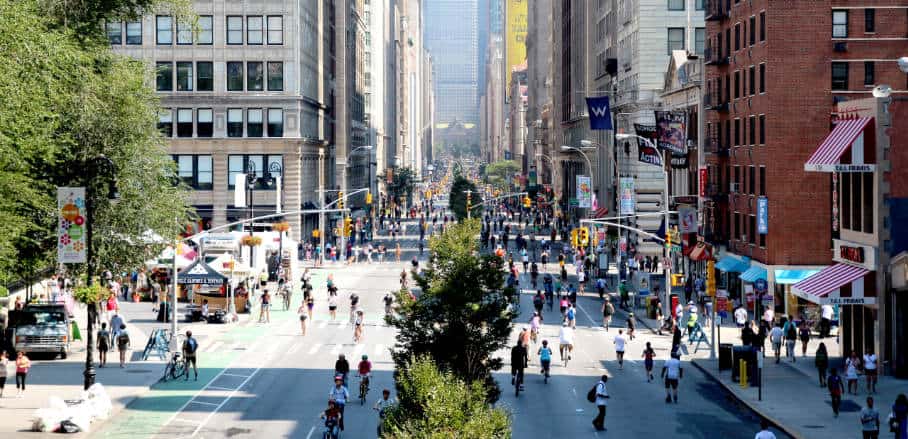Decarbonising Global Urban Transport: The COP27 Presidency Initiative LOTUS
There is no panacea, no silver bullet: Only a holistic approach to technology and urban mobility will ensure sustainable transport for the sake of people and planet. Led by the Egyptian COP27 Presidency, the Low Carbon Transport for Urban Sustainability (LOTUS) initiative was launched. By Christopher Dekki
For many years, the sustainable, low carbon transport community has had to fight for a meaningful place in the UN’s climate change process – the UN Framework Convention on Climate Change (UNFCCC), its annual Conference of the Parties (COPs) and the many meetings that happen before a COP. Even as transport emissions continued to rise year after year, the world did not take the sector’s impact on the climate seriously enough. Nevertheless, the sustainable, low carbon transport community strengthened its advocacy, built strong relationships with key entities and stakeholders, and increased awareness of the reality of growing emissions from transport – as well as the critical need to bring about a paradigm shift in how we move people and goods.
Weaning Car-Loving Societies Off the Engine is Important – But Not Enough
Thanks to this work by the community, efforts to make transport more sustainable have risen sharply, both inside and outside the intergovernmental process. Today, transportation is one of the primary thematic groups within the UNFCCC Marrakech Partnership, the Paris Agreement-mandated platform that works to increase climate action in several economic sectors, and for which my organisation, the SLOCAT Partnership, acts as a transport co-focal point. At COP26 in Glasgow in 2021, transport was given an entire thematic day, with the UK COP26 Presidency leading and supporting the launch of several initiatives and policy declarations that were transport-focused, including the Zero Emission Vehicle Transition Council (ZEVTC). These initiatives are undoubtedly helping to transform transport in meaningful ways and are instigating vast improvements in vehicle fleets, from private cars to heavy and medium-duty vehicles.
And yet, even though transport’s profile has been enhanced and the dangers of fossil fuel-powered mobility are becoming ever more apparent and scrutinised, the types of interventions in the transport sector still matter. So, while the SLOCAT Secretariat assists the UK and others on matters related to vehicle electrification, we have always been critical of what has been left behind by all of these vehicle-based efforts: a much-needed focus on the transformation of transport in cities through scaling up public transport, walking and cycling infrastructure.
As the world hits 8 billion people, with most living in urban areas, the most equitable, meaningful, and sustainable interventions in the transport sector must go beyond just the improvement of vehicles. While weaning car-loving societies and people off the internal combustion engine will absolutely reduce transport emissions of the more affluent (a shift in which the world is in dire need), less privileged people in both the so-called Global North and South still require attention in order to satisfy their mobility needs. This can be achieved by implementing policy measures and shifting finance towards public transport, walking and cycling.
COP27: Filling the Gaps Left by Previous Initiatives
For this reason, the Egypt COP27 Presidency has sought to shift gears and launch a transport initiative that can fill a few of the gaps left by existing initiatives. Working directly with SLOCAT and its many partners, which include organisations that champion public transport, walking and cycling, informal transport and the pressing mobility needs of people (as well as a vast number of other types of entities, from UN agencies and multilateral development banks), the Low Carbon Transport for Urban Sustainability (LOTUS) initiative was developed.
Facilitated by the SLOCAT Secretariat and the Boston Consulting Group (BCG), the wide multistakeholder consultative process that produced LOTUS identified five systemic challenges in the realm of urban transport that must be overcome: finance gaps, weak policymaking, lack of policy coherence, difficulties around integrating and regulating informal transport, and siloed thinking around modes of transport. As a result, LOTUS proposes three action areas that collectively address these challenges but are individually distinct and specific enough to deliver near-term impact, including:
- Scale up investment for e-vehicles and sustainable mobility infrastructure;
- Empower and invest in informal transportation to decarbonise and mobilise towards SDG 11 – Sustainable cities and communities, achieve climate resilience, and develop a global agenda for a just transition and transformation;
- Build capacity to develop integrated, multimodal policy frameworks in low- and middle-income countries.
LOTUS will facilitate several multi-stakeholder, coordinated efforts to ensure progress on these action areas.
From COP27 to City Streets
As the dust settles from COP27, and as key transport organisations begin to coalesce around each of the action areas of LOTUS (already with defined co-leads), the next step is to ensure that the efforts related to the transformation of urban transport and mobility are taken up by the next COP Presidency, the United Arab Emirates. It behoves no one for a Presidency to ignore what came before and start completely fresh. COP26 saw the establishment of critical technology and vehicle-focused transport initiatives, while COP27 and LOTUS shifted attention to urban transport. Now it is up to the COP28 Presidency to further this work, engage with all stakeholders involved and guarantee continuity for the sake of people and planet.
